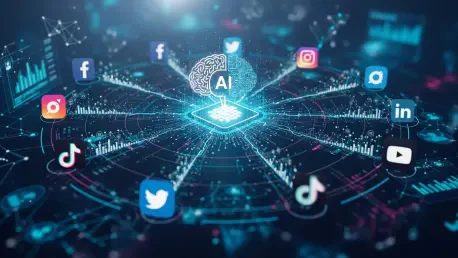Imagine a world where a single post on a social platform can instantly adapt to individual user preferences, trigger personalized customer responses, and drive sales—all without human intervention. In 2025, this is no longer just a vision but a reality, thanks to AI-driven social media integrations that are redefining digital marketing. These sophisticated systems seamlessly connect platforms, tools, and data analytics to create powerful, automated ecosystems. This review explores the capabilities, performance, and transformative impact of these integrations, shedding light on how they are shaping strategies for businesses aiming to stay ahead in a hyper-connected digital landscape.
Key Features and Functionalities
AI-driven social media integrations stand out for their ability to streamline complex marketing processes through intelligent automation and data-driven insights. At the core of these systems lies the power of artificial intelligence, which enables dynamic content creation and precise audience targeting. Tools leveraging predictive analytics can now anticipate trending topics on platforms like TikTok and Instagram, crafting tailored posts that resonate with specific demographics. Engagement metrics reveal a significant uptick, with some businesses reporting increases of over 40% in user interaction due to AI-personalized content.
Beyond content, automation plays a pivotal role in enhancing workflow efficiency. Integrations with customer relationship management (CRM) systems and chatbots facilitate instant responses to inquiries via direct messages, cutting response times dramatically. Platforms such as Buffer and Hootsuite exemplify this by offering cross-platform scheduling and consolidated analytics, allowing marketers to manage multiple accounts effortlessly. This reduction in manual workload frees up teams to focus on strategy rather than logistics, proving indispensable for agencies juggling diverse client needs.
Another standout feature is the integration of real-time analytics dashboards. These tools provide actionable insights by linking social data with e-commerce and sales metrics, enabling brands to measure return on investment (ROI) with unprecedented accuracy. The ability to track performance beyond superficial metrics like follower counts—focusing instead on shares and conversions—empowers businesses to refine their approaches continuously. Such depth in analysis marks a significant leap in how marketing effectiveness is evaluated.
Performance Across Industries
The practical applications of AI-driven social media integrations span a wide array of sectors, demonstrating versatility and impact. In retail, social commerce features on platforms like Instagram allow for seamless shopping experiences directly from feeds, with integrated analytics showing a marked improvement in conversion rates. Case studies highlight brands achieving up to a 30% boost in sales through targeted social ads linked to e-commerce systems, illustrating the direct financial benefits of these tools.
Entertainment and influencer marketing also reap substantial rewards from these technologies. Collaborations between creators and brands are streamlined through automated matching algorithms that pair influencers with campaigns based on audience overlap and engagement history. Social live shopping events, amplified by AI-driven recommendations, have transformed passive viewers into active buyers, with metrics indicating higher engagement during live sessions compared to static posts.
Agency management represents another area of profound impact. Marketing firms utilize integrations to oversee multiple client accounts across diverse platforms, aggregating data into unified reports for strategic decision-making. This capability not only enhances operational efficiency but also strengthens client trust through transparent, data-backed results. The measurable outcomes—improved campaign performance and client retention—underscore the value of adopting these systems in high-stakes environments.
Emerging Trends and Innovations
As technology evolves in 2025, several trends are shaping the trajectory of social media integrations. The dominance of short-form video content continues to grow, with AI tools simplifying production through features like text-to-video generators. These innovations drastically reduce creation times while ensuring content aligns with platform-specific trends, a critical factor as user-generated videos drive engagement on large-scale platforms.
Social commerce remains a focal point, with integrations enabling brands to transform platforms into all-in-one hubs for entertainment and shopping. The fusion of augmented reality (AR) and virtual reality (VR) further enhances user experiences, offering immersive product previews directly within social feeds. Consumer demand for such interactive elements is influencing how businesses allocate marketing budgets toward tech-driven solutions.
Evolving user behaviors also play a significant role in steering innovation. The push for hyper-personalized experiences drives the development of deeper AI algorithms capable of predicting individual preferences with greater accuracy. This shift necessitates integrations that can handle vast data sets across multiple touchpoints, ensuring brands remain agile in responding to changing expectations over the coming years, from 2025 onward.
Challenges in Adoption
Despite their promise, AI-driven social media integrations face notable hurdles that temper widespread adoption. Data privacy concerns loom large, as businesses must navigate stringent regulations while handling sensitive user information. Ensuring compliance without compromising the effectiveness of personalized marketing remains a delicate balance that requires ongoing attention.
The complexity of unifying disparate systems poses another challenge. Integrating diverse platforms, each with unique architectures, often leads to technical bottlenecks that can disrupt workflows. Efforts to standardize protocols and enhance interoperability are underway, yet achieving seamless connectivity across all tools remains an elusive goal for many organizations.
Trust and transparency also emerge as critical issues. Users and regulators alike demand clarity on how data is utilized within these integrations, pushing companies to prioritize ethical practices. Addressing these concerns through robust security measures and clear communication is essential to maintaining credibility in a landscape increasingly scrutinized for data handling practices.
Final Verdict and Next Steps
Reflecting on this comprehensive evaluation, AI-driven social media integrations prove to be game-changers in 2025, offering unmatched efficiency and personalization in digital marketing. Their ability to automate content, streamline operations, and deliver measurable results across industries cements their status as indispensable tools. Challenges like data privacy and system complexity do temper their universal appeal, yet the trajectory of innovation suggests these barriers are surmountable with focused effort.
Moving forward, businesses should prioritize investing in scalable integration solutions that emphasize security and user trust to capitalize on these technologies. Exploring partnerships with platform developers to enhance interoperability could unlock further potential, ensuring seamless experiences. Additionally, staying attuned to consumer expectations around personalization and immersive content will be crucial for leveraging the full spectrum of AI capabilities. As the digital realm continues to evolve, proactive adaptation to these integrations will define the leaders in an increasingly interconnected marketing landscape.









